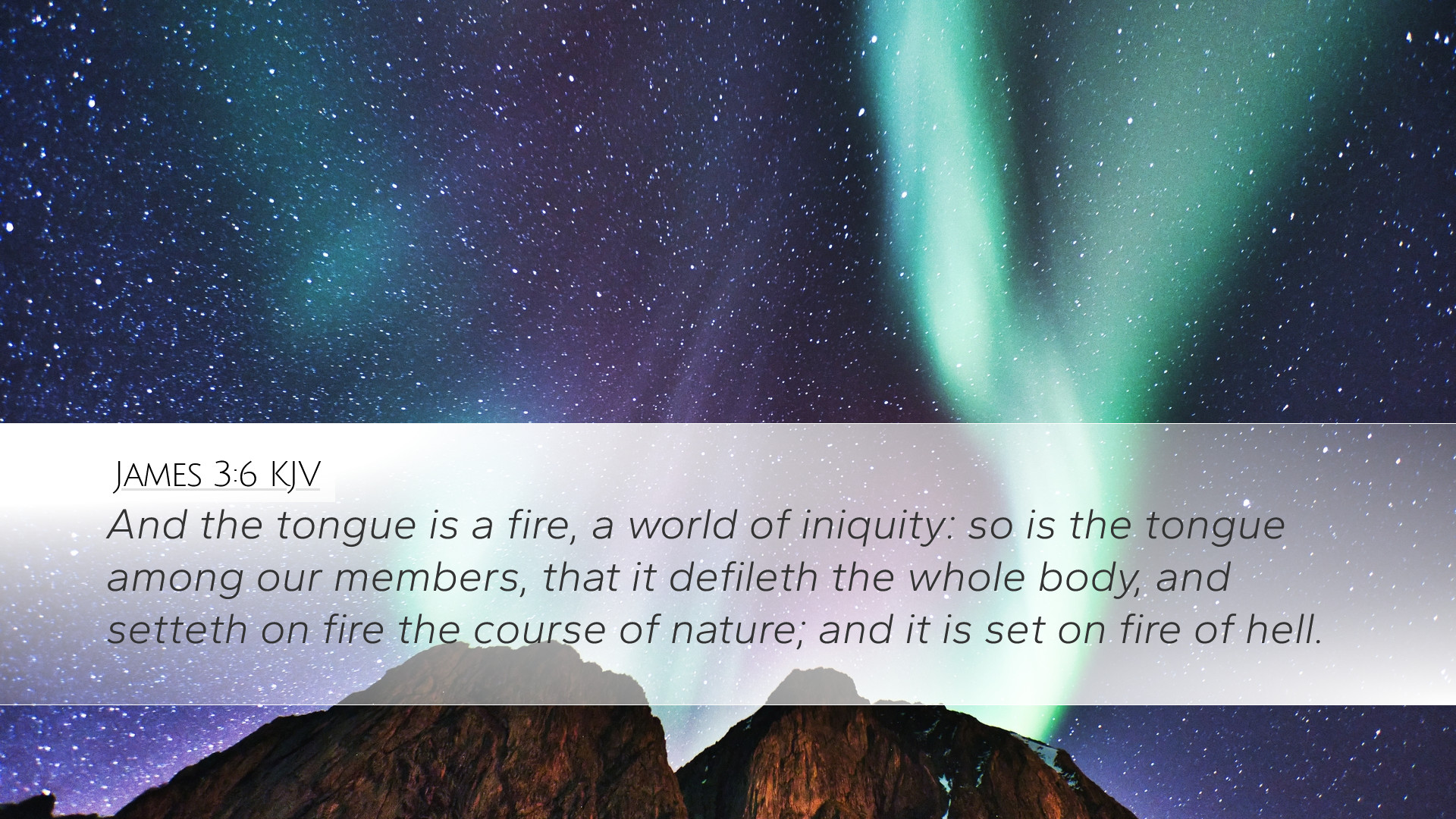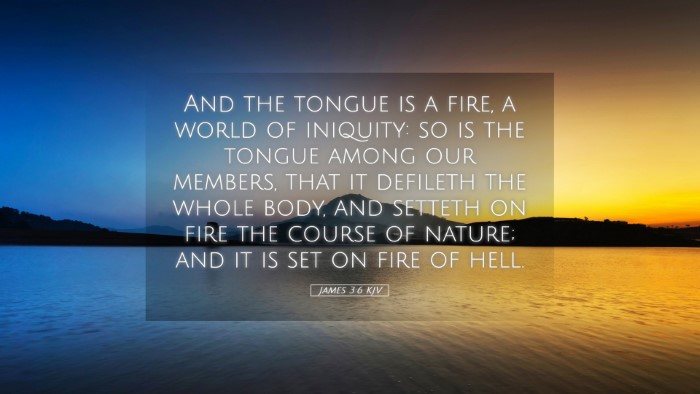Old Testament
Genesis Exodus Leviticus Numbers Deuteronomy Joshua Judges Ruth 1 Samuel 2 Samuel 1 Kings 2 Kings 1 Chronicles 2 Chronicles Ezra Nehemiah Esther Job Psalms Proverbs Ecclesiastes Song of Solomon Isaiah Jeremiah Lamentations Ezekiel Daniel Hosea Joel Amos Obadiah Jonah Micah Nahum Habakkuk Zephaniah Haggai Zechariah MalachiJames 3:6
James 3:6 KJV
And the tongue is a fire, a world of iniquity: so is the tongue among our members, that it defileth the whole body, and setteth on fire the course of nature; and it is set on fire of hell.
James 3:6 Bible Commentary
Commentary on James 3:6
James 3:6 reads: “And the tongue is a fire, a world of iniquity: so is the tongue among our members, that it defileth the whole body, and setteth on fire the course of nature; and it is set on fire of hell.” This verse illustrates the destructive power of the tongue and offers a sobering insight into its implications for believers.
Introduction
This verse serves as a point of serious reflection for pastors, theologians, and students of the word. The imagery that James employs in this passage is vivid and compelling, emphasizing the tongue's potential to cause harm or provoke chaos. The commentaries of respected biblical scholars provide profound insight into understanding the implications of this warning.
Understanding the Metaphor
James begins by likening the tongue to a fire. This metaphor signifies the dual nature of the tongue: it possesses the ability to ignite and spread destruction.
- Matthew Henry points out that just as fire can spread quickly and uncontrollably, so words can incite anger, envy, and discord. The destructive qualities of fire are mirrored in the potentially harmful words we choose to speak.
- Albert Barnes elaborates on this fire metaphor, asserting that the tongue spreads the “fires of sin” among individuals, thereby contaminating souls and communities.
- Adam Clarke notes that the tongue, though a relatively small member of the body, holds immense power - akin to how a small spark can set ablaze an expansive forest.
The World of Iniquity
James continues by describing the tongue as a “world of iniquity.” This phrase encapsulates the broader implications of human propensity toward sinfulness.
- According to Matthew Henry, this indicates that the entire system of sin can be initiated or perpetuated through the improper use of our speech. Our words can be a catalyst for both personal and communal evil.
- Albert Barnes highlights that this “world of iniquity” emphasizes how the tongue operates within the world as an agent of controversy, discontent, and moral degradation.
- Adam Clarke stresses the ethical responsibility that accompanies our speech; by understanding the power embedded in our words, we may strive to harness this power for constructive rather than destructive purposes.
Defilement of the Whole Body
James further indicates that the tongue can defile the whole body. This corrupting influence serves as a critical reminder of the holistic impact of our words.
- Matthew Henry states that the corruptions of the tongue provoke disarray not just in personal relationships, but in our entire being. Our words can impact the integrity of our conduct, thoughts, and ultimately our character.
- Albert Barnes expounds that the defilement signifies how our speech can impact our spiritual life, distracting us from righteousness and hindering our relationship with God.
- Adam Clarke adds that the misuses of the tongue are profound in their reach, potentially leading to a general moral decline within communities and churches.
Setting on Fire the Course of Nature
Furthermore, James mentions that the tongue “sets on fire the course of nature.” This phrase demonstrates the far-reaching effects of speech.
- Matthew Henry argues that this reference implies a sequence whereby the words we speak can influence both the present and future, establishing patterns in our lives and communities that may be difficult to break.
- Albert Barnes reflects upon how harmful speech can initiate cycles of discord and conflict. The rippling effects underscore the necessity of practicing caution in our discourse.
- Adam Clarke posits that the course of nature signifies the trajectory of a person's life; thus, the tongue's misuse can derail a person from the divine purposes God has established for them.
Set on Fire of Hell
Lastly, James makes an alarming claim that the tongue is “set on fire of hell.” This phrase serves as a stark warning about the source of our harmful speech.
- Matthew Henry interprets this as a revelation of the spiritual battle that exists over our speech, suggesting that evil forces can incite our words, highlighting the need for continuous vigilance in our lives as believers.
- Albert Barnes warns that allowing our tongues to be influenced by evil can lead to spiritual destruction, marking a betrayal of our commitment to Christ.
- Adam Clarke asserts that this line traps the very essence of the theological principle of sin's pervasive influence; it can dominate our speech if we do not guard against it.
Conclusion
James 3:6 serves as a potent reminder of the significant role our speech plays in our spiritual lives and in our interactions with others. This exhortation invites believers to reflect deeply on the words they utter, recognizing that their utterances can bear tremendous consequences. It challenges pastors, scholars, and students alike to embody responsible expressions of faith through speech, ensuring that their words reflect their belief in the transformative power of Christ.
In the spirit of humility and repentance, let us seek to harness the power of our tongues for good, glorifying God and edifying one another.


